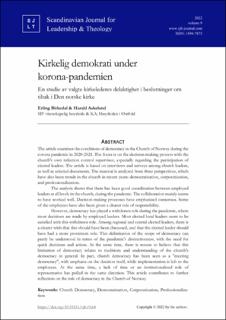| dc.contributor.author | Birkedal, Erling | |
| dc.contributor.author | Askeland, Harald | |
| dc.date.accessioned | 2022-10-20T10:43:31Z | |
| dc.date.available | 2022-10-20T10:43:31Z | |
| dc.date.created | 2022-10-05T14:49:43Z | |
| dc.date.issued | 2022 | |
| dc.identifier.citation | Scandinavian Journal for Leadership & Theology. 2022, 9, 1-25. | en_US |
| dc.identifier.issn | 1894-7875 | |
| dc.identifier.uri | https://hdl.handle.net/11250/3027271 | |
| dc.description.abstract | The article examines the conditions of democracy in the Church of Norway during the corona pandemic in 2020-2021.The focus is on the decision-making process with the church's own infection control supervisor, especially regarding the participation of elected leaders. The article is based on interviews and surveys among church leaders, as well as selected documents. The material is analyzed from three perspectives, which have also been trends in the church in recent years: democratization, corporatization, and professionalization. The analysis shows that there has been good coordination between employed leaders at all levels in the church, during the pandemic. The collaboration mainly seems to have worked well. Decision-making processes have emphasized consensus. Some of the employees have also been given a clearer role of responsibility. However, democracy has played a withdrawn role during the pandemic, where most decisions are made by employed leaders. Most elected local leaders seem to be satisfied with this withdrawn role. Among regional and central elected leaders, there is a clearer wish that this should have been discussed, and that the elected leader should have had a more prominent role. This delimitation of the scope of democracy can partly be understood in terms of the pandemic's distinctiveness, with the need for quick decisions and action. At the same time, there is reason to believe that this limitation of democracy relates to traditions and understanding of the church's democracy in general. In part, church democracy has been seen as a "meeting democracy", with emphasis on the decision itself, while implementation is left to the employees. At the same time, a lack of time or an institutionalized role of representative has pulled in the same direction. This article contributes to further reflection on the role of democracy in the Church of Norway. | en_US |
| dc.language.iso | nob | en_US |
| dc.publisher | Ansgar University College, Academy for Leadership and Theology, Norwegian School of Leadership and Theology | en_US |
| dc.rights | Attribution-NonCommercial-NoDerivatives 4.0 Internasjonal | * |
| dc.rights.uri | http://creativecommons.org/licenses/by-nc-nd/4.0/deed.no | * |
| dc.subject | church democracy | en_US |
| dc.subject | democratization | en_US |
| dc.subject | corporatization | en_US |
| dc.subject | professionalization | en_US |
| dc.title | Kirkelig demokrati under korona-pandemien: En studie av valgte kirkelederes delaktighet i beslutninger om tiltak i Den norske kirke. | en_US |
| dc.title.alternative | Church democracy during the corona pandemic: A study of elected church leaders' participation in decisions about measures in the Church of Norway | en_US |
| dc.type | Peer reviewed | en_US |
| dc.type | Journal article | en_US |
| dc.description.version | publishedVersion | en_US |
| dc.rights.holder | © 2022 by the authors. | en_US |
| dc.subject.nsi | VDP::Humaniora: 000::Teologi og religionsvitenskap: 150 | en_US |
| dc.source.pagenumber | 1-25 | en_US |
| dc.source.volume | 9 | en_US |
| dc.source.journal | Scandinavian Journal for Leadership & Theology | en_US |
| dc.identifier.doi | 10.53311/sjlt.v9.64 | |
| dc.identifier.cristin | 2058853 | |
| cristin.ispublished | true | |
| cristin.fulltext | original | |
| cristin.qualitycode | 1 | |

